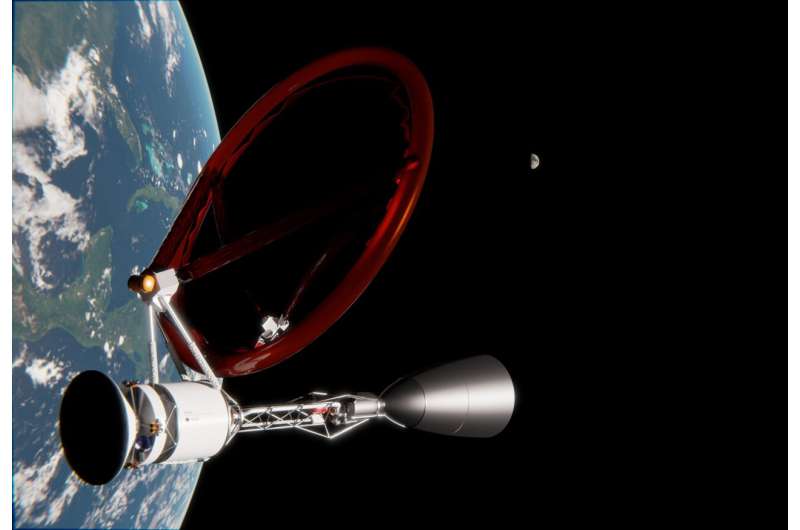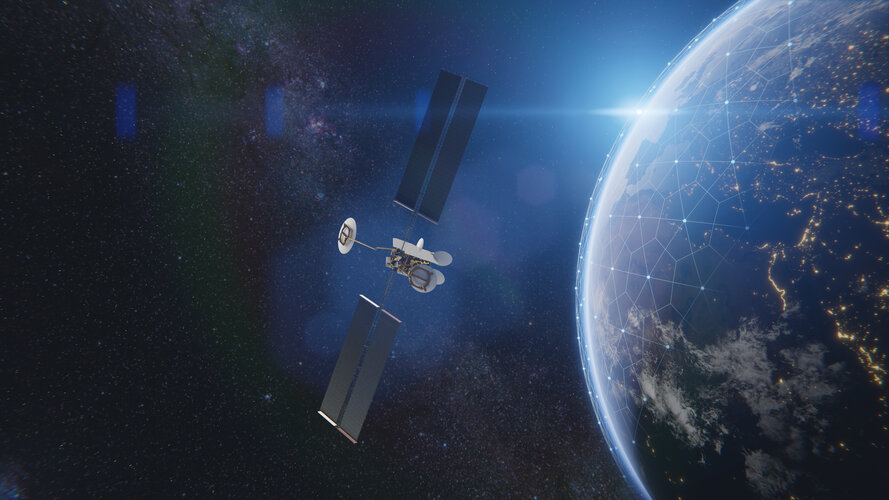
Copernical Team
Asteroid sharing Earth's orbit discovered - could it help future space missions?
 Research has shown that the Earth trails an asteroid barely a kilometre across in its orbit about the Sun - only the second such body to have ever been spotted. It goes round the Sun on average two months ahead of the Earth, dancing around in front like an excited herald of our coming.
This object, known as 2020 XL5, was first spotted in December 2020 using Pan-STARRS telescopes on the sum
Research has shown that the Earth trails an asteroid barely a kilometre across in its orbit about the Sun - only the second such body to have ever been spotted. It goes round the Sun on average two months ahead of the Earth, dancing around in front like an excited herald of our coming.
This object, known as 2020 XL5, was first spotted in December 2020 using Pan-STARRS telescopes on the sum Riding a laser to Mars

Could a laser send a spacecraft to Mars? That's a proposed mission from a group at McGill University, designed to meet a solicitation from NASA. The laser, a 10-meter wide array on Earth, would heat hydrogen plasma in a chamber behind the spacecraft, producing thrust from hydrogen gas and sending it to Mars in only 45 days. There, it would aerobrake in Mars' atmosphere, shuttling supplies to human colonists or, someday perhaps, even humans themselves.
In 2018, NASA challenged engineers to design a mission to Mars that would deliver a payload of at least 1,000 kilograms in no more than 45 days, as well as longer trips deep into, and out of, the solar system. The short delivery time is motivated by a desire to ferry shipments and, someday, astronauts to Mars while minimizing their exposure to the damaging effects of galactic cosmic rays and solar storms.
Protecting dark and quiet skies from satellite constellation interference

If you've ever tried to star gaze in a residential or urban area, you know that a streetlight or even the lights from a nearby town can greatly interfere with your ability to identify Orion's Belt and see a rare comet or other celestial bodies. But what is more of a disappointment for us is a cosmic disruption for scientists and others in the space industry.
To preserve this vital characteristic of the universe, a new International Astronomical Union Centre for the Protection of the Dark Sky from Satellite Constellation Interference has been established.
Siegfried Eggl, faculty member in the Department of Aerospace Engineering at the University of Illinois Urbana-Champaign and Robert Gruendl in Illinois' Dept. of Astronomy have been selected to participate. They are both members of the Center for AstroPhysical Surveys in the National Center for Supercomputing Applications at UIUC.
Monitoring crop health across the Netherlands

The Copernicus Sentinel satellite missions measure and image our planet in different ways to return a wealth of complementary information so that we can understand and track how our world is changing, and how to better manage our environment and resources. Thanks to the benefits of different types of data from two particular Copernicus Sentinel missions and an ingenious new dataset tool, people working in the agriculture sector, but who are not satellite data experts, can monitor the health and development of crops, right down to each crop in individual fields.
ESA seeks software ideas to bring smart satellites to life

If we were to talk about our bodies in the technical terms that we typically use to talk about spacecraft, our bones, muscles and ligaments would be our 'hardware', our brain the 'central processing unit (CPU)', and our nervous system the 'software'.
Tonga eruption sent ripples through Earth's ionosphere
 The powerful underwater volcanic eruption that blanketed the island nation of Tonga with ash and sent tsunami waves across the world also caused ripples in Earth's ionosphere, according to measurements from the Global Differential Global Positioning System (GDGPS) managed by NASA's Jet Propulsion Laboratory in Southern California.
When the Hunga Tonga-Hunga Ha'apai volcano erupted on Jan.
The powerful underwater volcanic eruption that blanketed the island nation of Tonga with ash and sent tsunami waves across the world also caused ripples in Earth's ionosphere, according to measurements from the Global Differential Global Positioning System (GDGPS) managed by NASA's Jet Propulsion Laboratory in Southern California.
When the Hunga Tonga-Hunga Ha'apai volcano erupted on Jan. Collaborative research project on quantum technology starts on the International Space Station
 In early December 2021, the project "Development of a laser system for experiments with Bose-Einstein condensates on the International Space Station within the BECCAL payload (BECCAL-II)" commenced, with the involvement of a team of researchers led by Professor Patrick Windpassinger and Dr. Andre Wenzlawski from Johannes Gutenberg University Mainz (JGU).
In collaboration with Humboldt-Univ
In early December 2021, the project "Development of a laser system for experiments with Bose-Einstein condensates on the International Space Station within the BECCAL payload (BECCAL-II)" commenced, with the involvement of a team of researchers led by Professor Patrick Windpassinger and Dr. Andre Wenzlawski from Johannes Gutenberg University Mainz (JGU).
In collaboration with Humboldt-Univ Scientists develop exceptional surface to explore exotic physics
 By demonstrating exceptional control of an open optical system, an international research team has provided a path to experimentally measure and test exotic phenomena and gain insights into new physics with exquisite sensitivity.
Reported in Nature Communications, the Penn State, Michigan Technological University and Vienna University of Technology researchers created a stable surface of '
By demonstrating exceptional control of an open optical system, an international research team has provided a path to experimentally measure and test exotic phenomena and gain insights into new physics with exquisite sensitivity.
Reported in Nature Communications, the Penn State, Michigan Technological University and Vienna University of Technology researchers created a stable surface of ' Researchers set record by preserving quantum states for more than 5 seconds
Protons are probably actually smaller than long thought
 A few years ago, a novel measurement technique showed that protons are probably smaller than had been assumed since the 1990s. The discrepancy surprised the scientific community; some researchers even believed that the Standard Model of particle physics would have to be changed.
Physicists at the University of Bonn and the Technical University of Darmstadt have now developed a method that
A few years ago, a novel measurement technique showed that protons are probably smaller than had been assumed since the 1990s. The discrepancy surprised the scientific community; some researchers even believed that the Standard Model of particle physics would have to be changed.
Physicists at the University of Bonn and the Technical University of Darmstadt have now developed a method that 